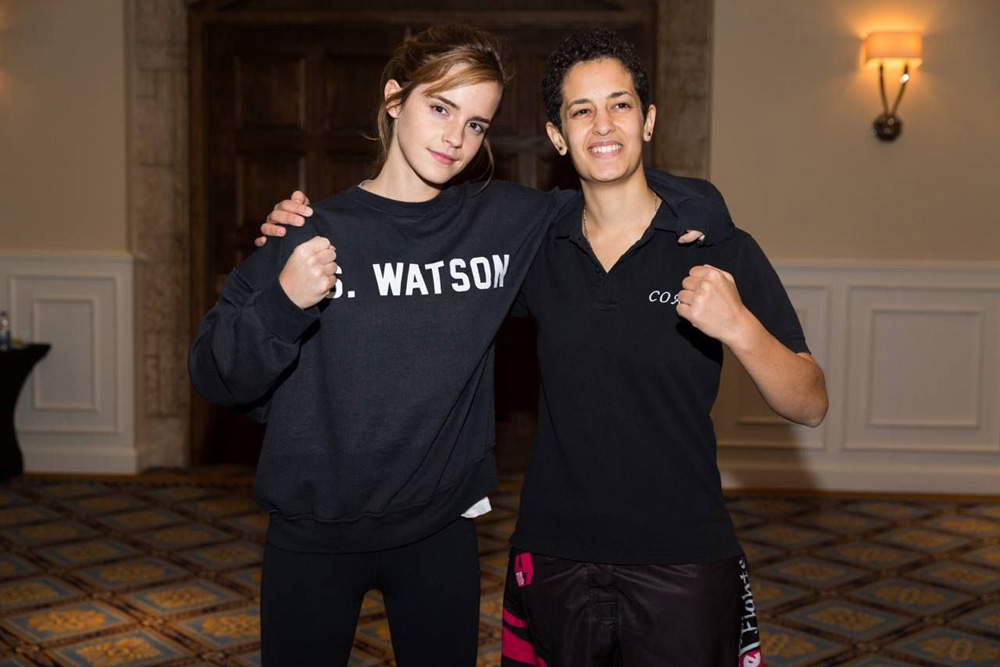
Lina Khalifeh
What can be more emboldening than knowing you can protect yourself whenever there’s danger around? With SheFighter, the first self-defense studio in the Middle East designed to empower women and girls mentally and physiologically, Lina Khalifeh is ensuring females feel more confident, secure and able to defend themselves from all kinds of violent situations. As well as a mix of Taekwondo, boxing and self-defense that sees her students doing jabs, crosses and left-hooks, she incorporates yoga, fitness and self-confidence building exercises in her method.
Ever since she was a child, Khalifeh has been a fighter. Despite the challenges and harassment she faced while training in Taekwondo, which was male-dominated back then, she earned a black belt. Then with over 17 years in punching, jabbing and kicking her way through national and international competitions in Kung Fu and kickboxing as well, Jordanian Khalifeh was inspired to do something to combat domestic violence. Unable to find “one real solution for violence against women,” the Canadian and American certified trainer started instructing women in the basement of her parents’ house and partnering in gyms before opening the first SheFighter studio in Amman in 2012. Now working with a team of trainers and administrators, plans for a global expansion and ex President Barrack Obama calling her a “leader of social change,” Khalifeh has certainly come a long way since then.
As part of our series on highly successful women who have been invited to speak at the 19th Global WIL Economic Forum taking place in Dubai on October 25-26, we have a chat with the inspiring entrepreneur. We ask about the barriers women face in the region, her most difficult decision, tips on climbing the career ladder and a lot more.

Emma Watson and Lina Khalife
Name three women who have inspired you.
Oprah Winfrey, my grandmother and Queen Elizabeth I.
Can you share some strategies that can aid women achieve a more prominent role in their companies?
Trust their teams and delegate tasks to the people who are competent, they don’t have to do everything by themselves.
Tell us about the most significant leadership lesson you’ve learned in your career.
My path taught me to be persistent, to keep succeeding and never even think about failure. Failure happens when things are not meant to be.
And what are the most important barriers to female leadership in the region?
I would say their minds are their own biggest barriers. They can achieve anything if they free their minds from fear. Women still have to learn to become more risk-takers, invest money and be prepared to sometimes lose money. They have to stop thinking about the ‘what ifs’ and ‘just do it’, like the Nike mantra.
Which kinds of challenges do you think the new generation of women face?
Lack of opportunities because men dominate most sectors.
What is the most difficult decision you've ever made?
Leaving Canada to go back to Jordan and start SheFighter.
Which particular qualities (some of the things you couldn’t include on your CV) have helped you get to where you are today?
I would say persistence, belief in myself and my abilities, passion, as well as honesty, commitment and dedication.
What do you do to keep yourself centered?
I always think about ‘solutions.’
What is your favourite quote?
“When life punches you in the face, stand up and say you punch like a baby.”
What’s the most exciting part about participating in the Global WIL Economic Forum?
Connecting with wonderful people and global leaders.
The theme this year is ‘The Butterfly Effect – From Intent to Impact.’ Why do you think it’s particularly important to focus on enacting social change at this time?
It’s because all businesses have to have a social purpose to solve problems in different countries.
The agenda explores diversity as the driving force of our collective future. Could you elaborate on that?
Diversity is really important, particularly in the work force to expand the mind and to accept differences and cultures.


















